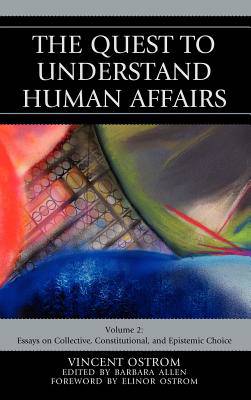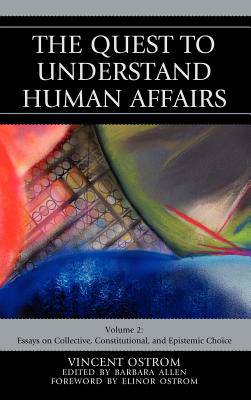
- Afhalen na 1 uur in een winkel met voorraad
- Gratis thuislevering in België vanaf € 30
- Ruim aanbod met 7 miljoen producten
- Afhalen na 1 uur in een winkel met voorraad
- Gratis thuislevering in België vanaf € 30
- Ruim aanbod met 7 miljoen producten
Zoeken
The Quest to Understand Human Affairs
Essays on Collective, Constitutional, and Epistemic Choice, Volume 2
Vincent Ostrom
€ 192,95
+ 385 punten
Uitvoering
Omschrijving
The second volume of The Quest to Understand Human Affairs presents thirty-six previously unpublished manuscripts written by Vincent Ostrom, cofounder of the Workshop in Political Theory and Policy Analysis. The essays are divided among three parts: Constitutional Choice, Epistemic Choice, and The Quest for Understanding and the Future of Democratic Self-Governance. Part I, Constitutional Choice, includes studies on public sector performance and the constitutional dilemmas facing the Federal Republic of Nigeria, the North American "New World" of US constitutionalism, and the United States of Mexico. In the essays of Part II, Ostrom turns to the foundational ideas on which the institutions of a particular culture rest. He raises questions about the methodologies of the social sciences and insists that we return to "basic questions" in our search for institutional forms that will liberate human communities. Part III offers the reader a colloquy on self-governance in which Ostrom's speeches and presentations on a variety of twenty-first-century issues are supplemented with letters and memos between Ostrom and visiting scholars and students. These remarkable works not only offer specialists insight into developments in the fields of institutional analysis, resource governance, policy and administration-during the second half of the twentieth century and first decade of the new millennium-but also speak to general readers about worldwide transformations in democracies and human and environment relations as well as the enduring challenge of sustaining just, productive political orders. The Quest to Understand Human Affairs is introduced with a foreword by Nobel Laureate and co-founder of the Workshop in Political Theory and Policy Analysis, Elinor Ostrom, with a preface by the editor of the volume, political theorist Barbara Allen.
Specificaties
Betrokkenen
- Auteur(s):
- Uitgeverij:
Inhoud
- Aantal bladzijden:
- 676
- Taal:
- Engels
- Reeks:
Eigenschappen
- Productcode (EAN):
- 9780739168059
- Verschijningsdatum:
- 9/02/2012
- Uitvoering:
- Hardcover
- Formaat:
- Genaaid
- Afmetingen:
- 155 mm x 231 mm
- Gewicht:
- 1179 g

Alleen bij Standaard Boekhandel
+ 385 punten op je klantenkaart van Standaard Boekhandel
Beoordelingen
We publiceren alleen reviews die voldoen aan de voorwaarden voor reviews. Bekijk onze voorwaarden voor reviews.











